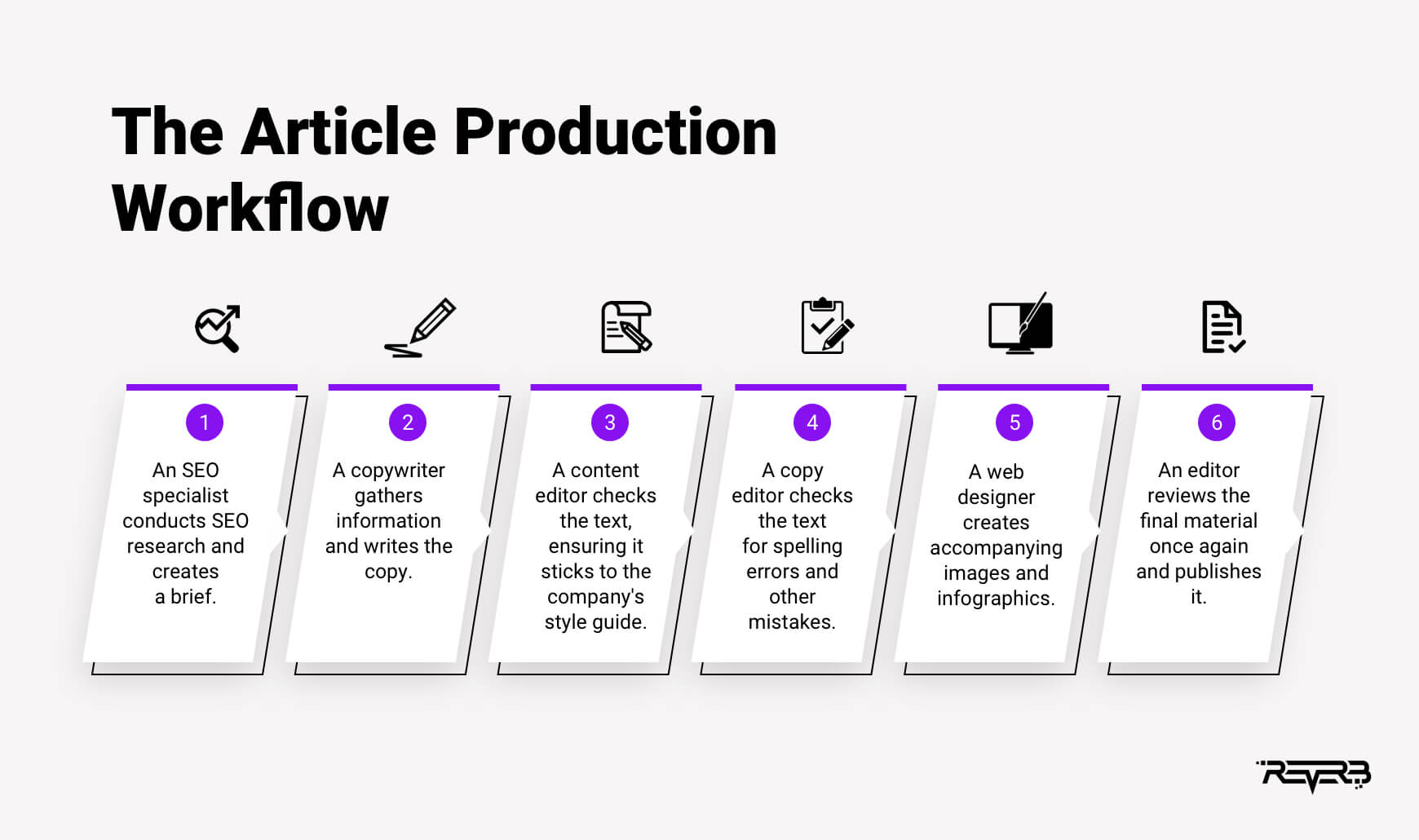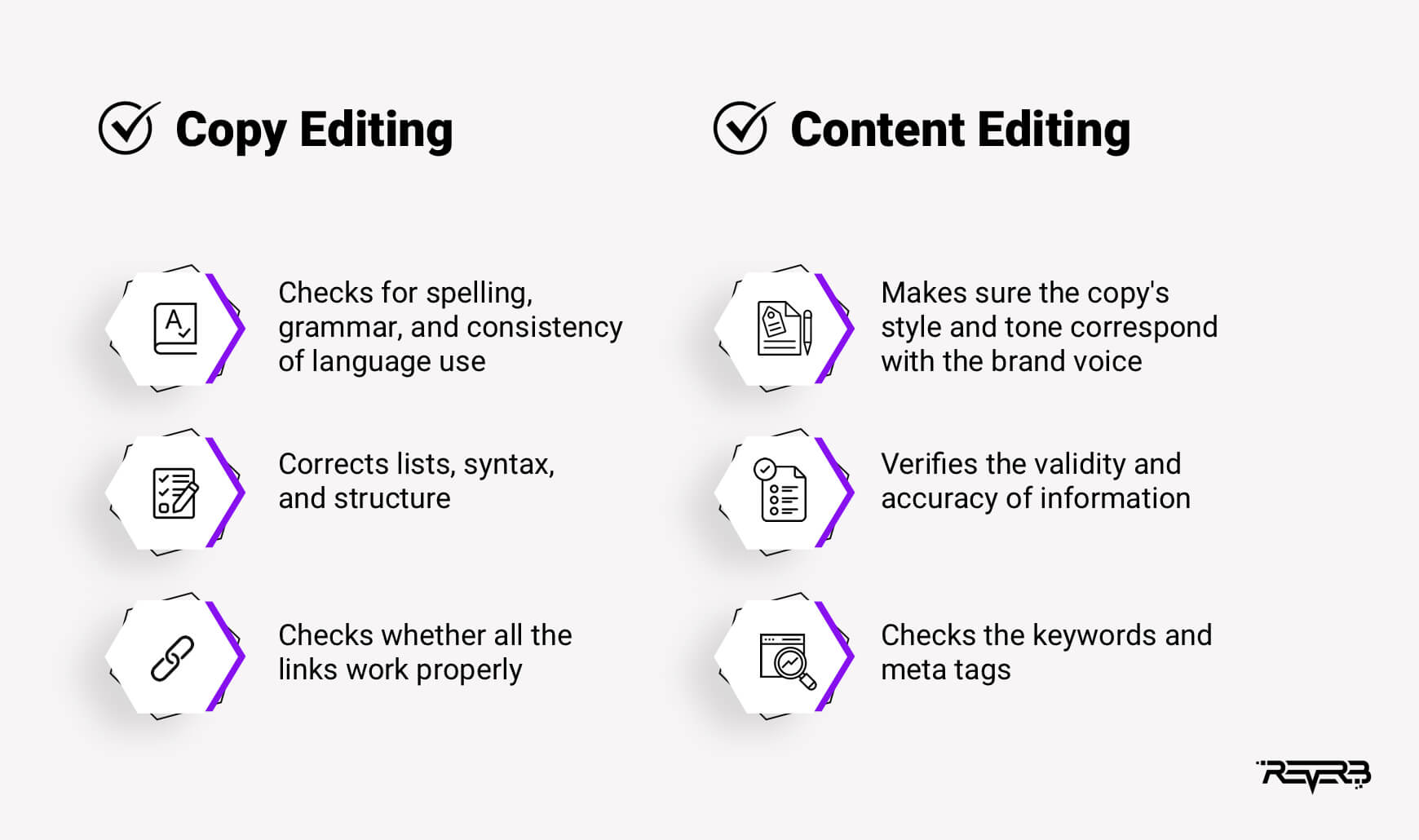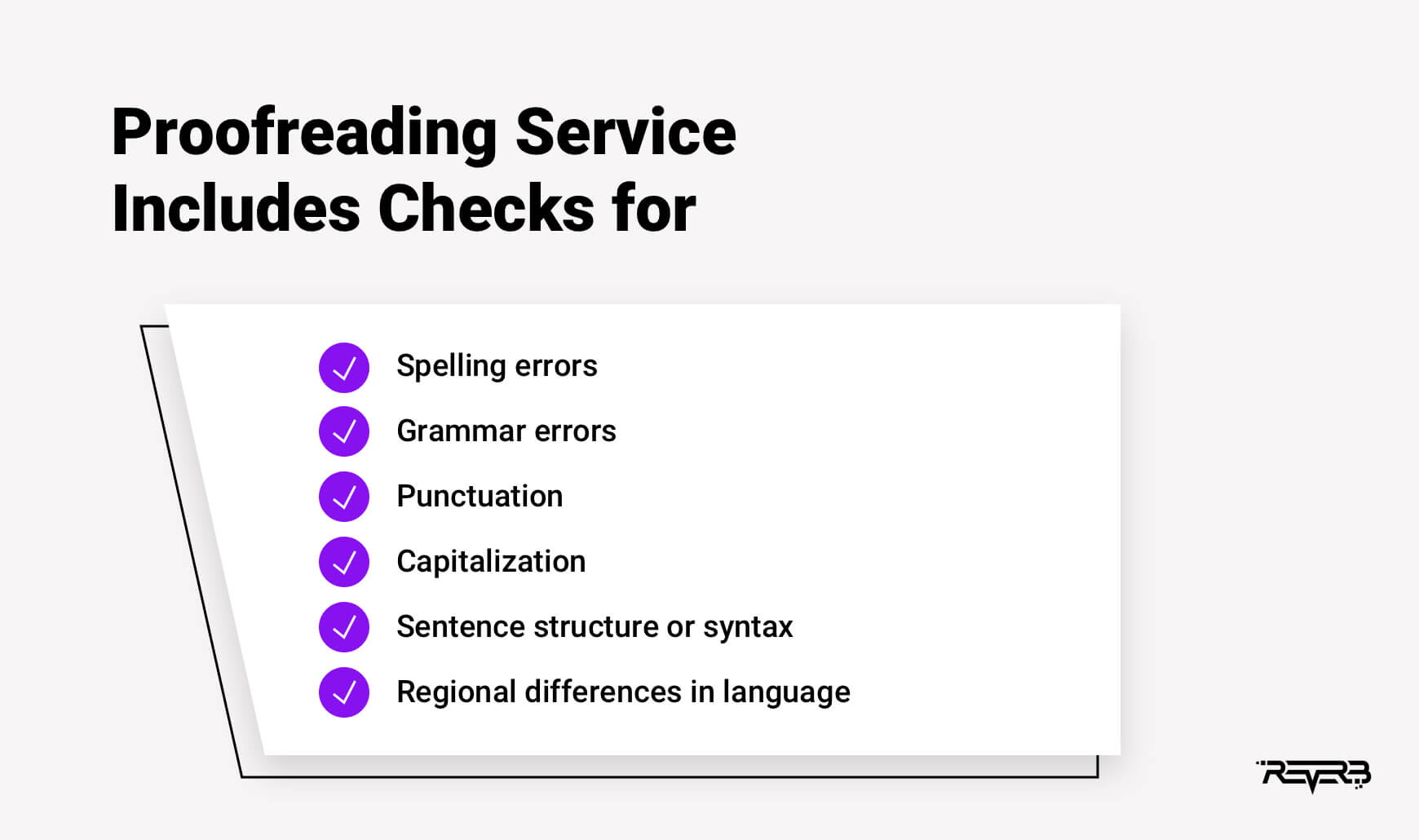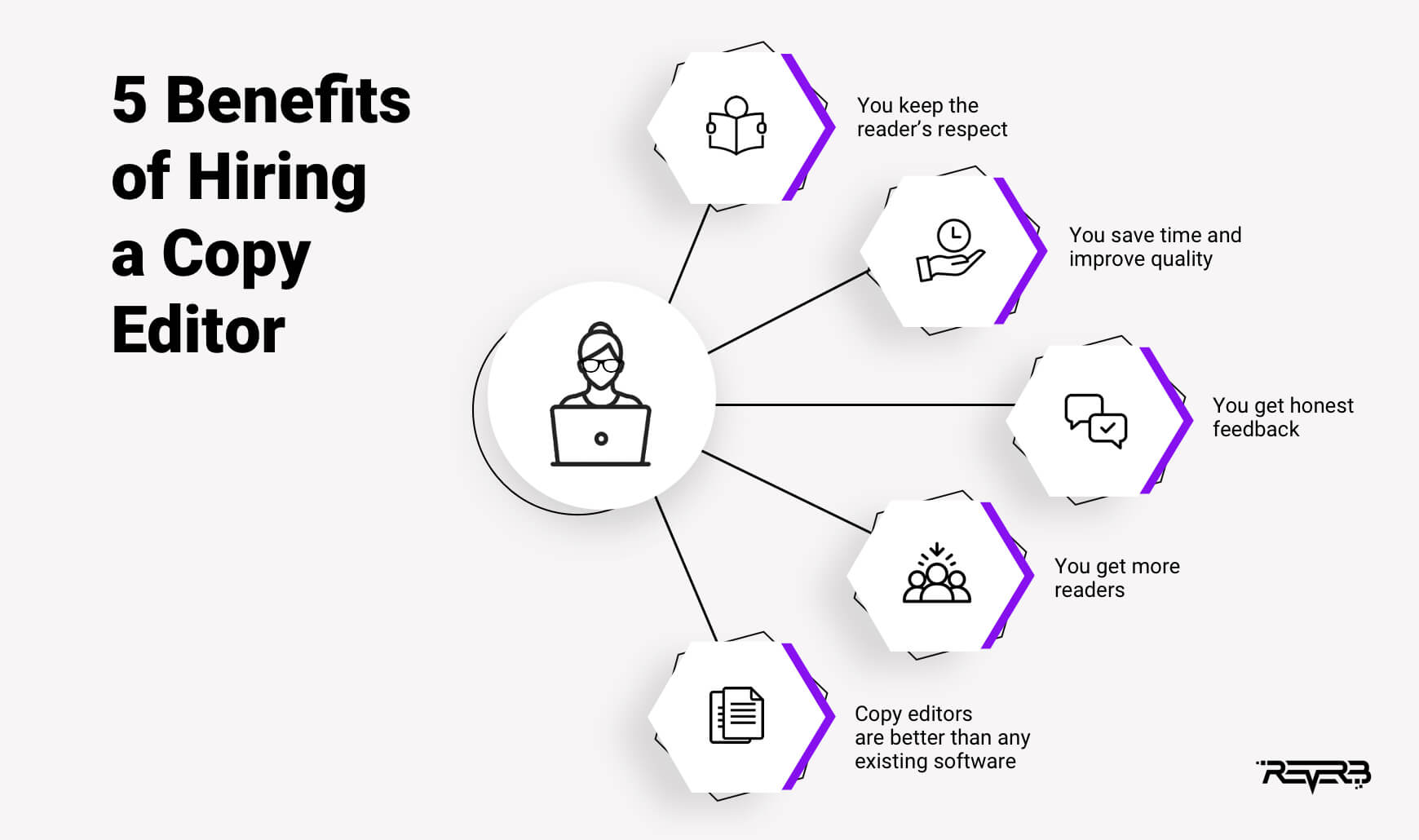Why do you need a copy editor for your site? Short answer: because a copy editor makes your website copy look flawless.
Even the most skilled writers make mistakes. They write a lot and do it fast, so there’s a high chance they can miss small grammatical rules or typos, especially if they aren’t native English speakers.
If you’re running a personal resource, checking the content in Grammarly may be enough. But in case you manage a corporate blog that is a bridge between you and your target audience, misspells and typos may cost you potential clients.
Here at ReVerb, we work with many companies from different countries and language backgrounds. As we want to provide the best-quality copywriting service, we have a team of native English-speaking editors who thoroughly check each article produced. Yes, this one has been reviewed, too.
In this guide, we’re going to explain what copy editors do and the benefits of hiring one for your site. Here’s what we’ll review:
- What is copy editing?
- Differences between copy editing vs content editing
- Types of copy editing
- Benefits of hiring a copy editor
Let’s start with fundamentals.
What is copy editing? The differences between copy editing and content editing
First of all, let’s overview the article production workflow:

-
- An SEO specialist conducts topic research, selects a list of quick-win keywords, and creates a brief for the writer.
- According to the SEO brief, a copywriter gathers information — conducts interviews, checks sources, etc. — and writes the copy.
- A content editor checks the text, ensuring it sticks to the company’s style guide, tone of voice, and the content is a good fit for their target audience.
- A copy editor then checks the text for spelling errors, awkward phrasing, grammar mistakes, and so on.
- A web designer creates accompanying images and infographics.
- An editor reviews the final material once again; checks how the text looks on the page, corrects too long paragraphs, verifies links, and makes sure the text works together with graphic or UI/UX design.
Lots of people are involved — and that’s just one article or a simple landing page.
Copy editing vs Content editing
Let’s define what copy editing is. Simply put, it’s the process of polishing a text. Copy editors fix problems with spelling, grammar, and consistency of language use. Imagine a student messes up the ‘affect’ and ‘effect’ words when writing a research paper. Such a minor mistake can change the whole content’s meaning and influence a final grade.
The basic copy editor’s job is to correct mistakes and typos. But they can always go the extra mile. What more can a copy editor do? They can correct lists and syntax or suggest another way to divide the text into paragraphs. It’s also great if the copy editor checks whether all the links in the text work properly. Same with the dates and numbers, and links to credible sources.
The content editor makes sure the copy’s style and tone correspond with the brand voice, the facts are accurate, and the keywords are where they belong. Usually, a copy editor checks the copy after content editors finish their work. It’s the final editing before publishing or printing the copy.

Again, you may not need all the specialists — copy and content editors, web designers, and proofreaders — to run an amateur blog about Apple devices. It’s enough to have good writers.
But in case it’s a business blog you’re running, having both a copy editor and content editor (which can be combined in one person) is a best practice.
Copy editing types
Copy editors may be responsible for quite a few things in addition to correcting typos. Optionally, they do a part of the content editors’ job.
We’re going to focus on the most common copy editing types:
1. Proofreading
The basic proofreading service includes checks for:
- Spelling errors
- Grammar errors
- Punctuation
- Capitalization
- Sentence structure or syntax
- Regional differences in language

Most writers use tools like Grammarly, Word, or Google Docs to check some of these points. Still, it’s always better to have a professional to double-check everything.
2. Readability edits
This duty means breaking long sentences into two or three short ones, adding bullet lists, making sure paragraphs are no longer than 6-7 lines, and so on.
Today’s gold standard is making copies easy to understand, omit Passive Voice, add examples, lists and images.
For instance, here are two sentences that answer the ‘What is copy editing?’ question:
- Copy editors are the specialists who are responsible for revising written material to improve readability and fitness, as well as ensuring that text is free of grammatical and factual errors.
- Copy editors correct poor spelling, grammar, and punctuation, and fix factual errors in texts.
The first one is from Wikipedia, and it sounds like a copy editing definition taken from an encyclopedia. If it’s not a technical paper you’re writing, your editor might ask you to simplify the phrase.
3. Comparing text against style guides
Most corporate blogs follow a style guide, either internal and crafted for a specific company or a general one like the Chicago Manual of Style, Microsoft Style Guide, etc.
These guides help to make all blog content look consistent. For example, company A asks writers not to write the word ‘site’ instead of ‘website.’ Or company B has specific fonts and heading formatting rules — font Times New Roman, size 12.
Copy editors make sure all content adheres to these rules, the formatting looks the same on all pages, specific terminology is in place.
4. Factual checks
Any person doing the editing needs to do fact-checking, too. In some cases, this falls to copy editors.
Let’s say you have an article about warehouse management. The author says that “76% of automated warehouses were more likely to boost inventory accuracy.” Looks real, but who knows, especially when there are no source links.
The editor uses lots of tools to check such facts — books, professional resources, websites like Statista, or, in most cases, simply googles stuff.
Same for images, dates, terms, and credible sources. Let’s say, the Microsoft website or PayPal documentation looks more credible than someone’s writing on Quora or Medium.
5. Consistency checks
Finally, the copy editing types also include consistency checks. From the tone of voice down to the font used on each page number.
For example, there are a few ways to write the word ‘e-commerce’: ecommerce, eCommerce, e-Commerce, etc. The editor’s job is to make sure you use the right version — and do it consistently throughout the whole article.
5 benefits of hiring a copy editor
Good copy editors don’t come cheap, but these expenses pay off quickly. Below, I’m listing five reasons why hiring an editor is a winning decision.

#1. You keep the reader’s respect
Errors can break the reader’s respect for a resource. But, as we’ve said, even great authors make them.
What does a copy editor do to improve a site’s reputation? They give you a fresh pair of eyes looking at the copy from another perspective. They haven’t gone over and over the text, as writers have, so they clearly see room for improvement if there is any.
#2. You save time and improve quality
First, not all writers — especially the top-paid ones — have time to triple-check each comma. They work a lot, and it’s hard to keep full attention for 4-5 hours of non-stop writing.
And some writers just don’t care about grammar rules, punctuation, or someone’s style guides. Does it affect their writing? Well, in a way. Does it make them bad writers? No, if they know their topic, share valuable insights, and add real examples from their practice.
By hiring a copy editor, you can still work with such writers and get high-quality copy. Then authors have more time for research and planning.
#3. You get honest feedback
Professional copy editors know how to leave feedback — not to over-criticize the copy, but don’t miss important moments. It’s objective, constructive criticism that is hard to find.
Writers can also benefit from working with editors. They don’t need to worry about minor things; if mistakes happen too often, they’ll know what topics to study.
#4. You get more readers
Of course, hiring a copy editor won’t make your traffic grow by 1000%. With an editor or not, all you can do is continue creating, promoting, and improving the content.
Most copy editors are professionals — they work with lots of articles, books, and papers, and some probably have a copywriting or journalistic background. They know how to make a copy look trustworthy, engaging, and visually compelling.
The better your copies get, the more visitors you’ll have. Especially when you use these content marketing tips.
#5. Copy editors are better than any existing software
I absolutely love Grammarly — it’s a great tool for checking misspellings, typos, and even grammar issues. But even this tool isn’t perfect.
Grammarly doesn’t see all the mistakes and often suggests correcting parts with no issues at all. So I always double-check its edits.
Microsoft Word, Google Docs, and Hemingway — all work in the same way. They aren’t perfect and need someone to attend to the copy after such checks.
Maybe one day they’ll get better, but now I am not lying awake at night as I rely on the editor to correct all my mistakes.
Conclusion
That’s it! I hope now you know the copy editing definition, as well as content editing and proofreading.
Here at ReVerb, we have US and UK copy editors that help over 800 companies from Ukraine, Russia, Belarus, and other non-native English-speaking regions. Editors check each text, making sure it’s correct, consistent, and written in a style that sounds natural to the US audience.
If you have great writers but need someone to look at the copy quality, just drop us a line. In case you want to onboard top-notch copywriters, contact us as well!








